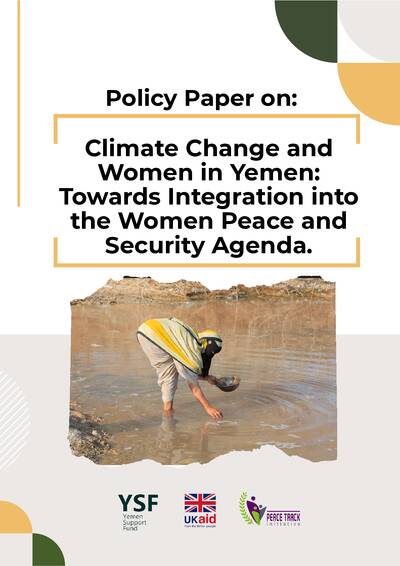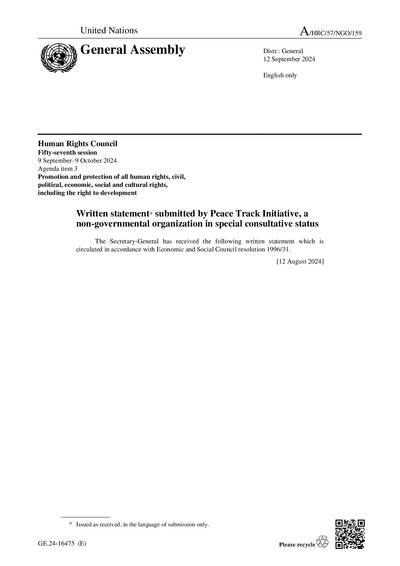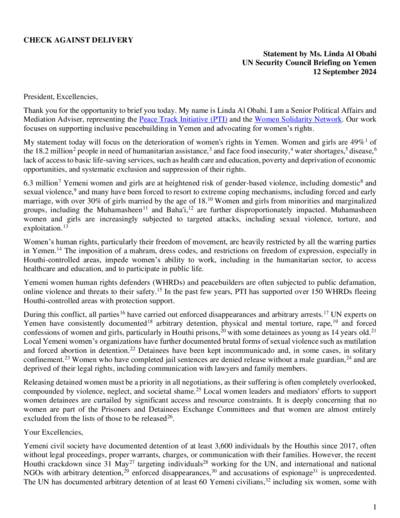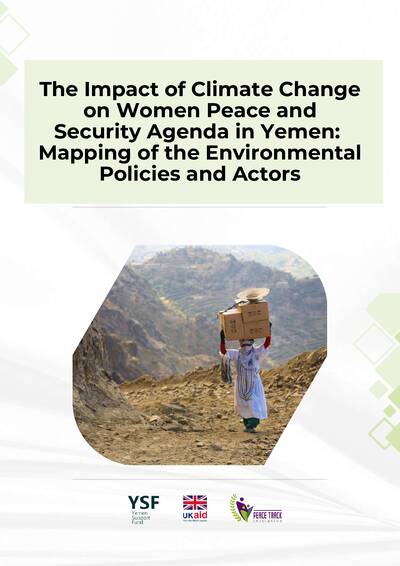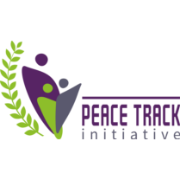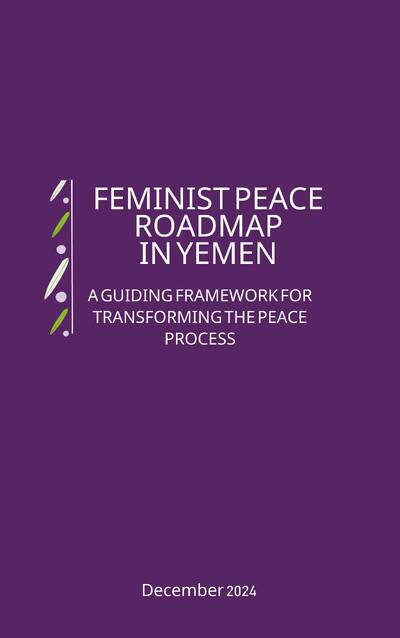
The December 2024 iteration of the Feminist Peace Roadmap (FPR) for Yemen represents a further development in the ongoing efforts toward a just, sustainable, and inclusive peace. Building on previous editions, this third version—formulated through consultations led by the Peace Track Initiative (PTI) and a broad coalition of Yemeni women leaders, feminist organizations, and partners—introduces and expands attention to a number of emerging and persistent issues. This overview is designed for the general public and for peacebuilding actors in Yemen, and offers insights into the roadmap’s approach, particularly its increased emphasis on climate change, the situations in Taiz and Al-Hudaydah, and the rights and inclusion of minority communities. Context and Evolution FPR 2024 is the outcome of years of engagement involving more than a thousand participants from varied political, civil, cultural, security, and military backgrounds across local and national contexts. It reflects a set of shared priorities and serves as a practical reference for mediators and negotiating teams. The roadmap defines “Feminist Peace” as “the achievement of peace and security for all, led by women, through a local and national peacebuilding process grounded in consensus and common ground. The process promotes broad and diverse participation and draws on the frameworks of human rights, gender equality, justice, and the rejection of violence.” This edition incorporates input from the Feminist Peace Allies Group in Yemen—comprising civil society actors, politicians, and experts—whose contributions have shaped its inclusive content and perspective on long-term peace. New and Expanded Areas of Focus in the 2024 Roadmap While maintaining its overall structure centered around a multi-phased peace process (De-escalation and Ceasefire; Comprehensive Peace Negotiations; and Governance and Transitional Priorities), the December 2024 FPR integrates new areas of focus, including: 1. Climate Change as a Compounding Factor The 2024 Roadmap places greater emphasis on the intersection between climate change and Yemen’s humanitarian and socio-economic challenges. It outlines the country’s increasing vulnerability to environmental disruptions such as floods, cyclones, droughts, and rising temperatures. These phenomena have led to adverse consequences for many communities, especially women and other groups with limited access to services, livelihoods, and protection mechanisms. Areas such as Al-Hudaydah and Al-Mahrah are cited as particularly exposed to these impacts. The roadmap notes the specific effects on women, including repeated displacement, barriers to healthcare, and heightened risks of gender-based violence in environmentally affected areas. It therefore recommends that climate considerations be systematically included in peacebuilding and reconstruction efforts. It suggests that overlooking these issues may contribute to further societal tensions and resource-based conflicts, and may reduce the ability of marginalized groups to participate in long-term recovery and peacebuilding. 2. Dynamics in Taiz and Al-Hudaydah The FPR 2024 allocates detailed attention to the situations in Taiz and Al-Hudaydah, two governorates that have experienced significant humanitarian and political challenges. Taiz: Formerly a cultural and economic hub, Taiz has undergone extended conflict and siege, resulting in infrastructure destruction and limited access to water and basic services. The roadmap references the partial reopening of Al-Qasr Street in June 2024 as a development that facilitated some movement within the city, while also emphasizing that such steps remain fragile in the absence of broader political and security agreements. Localized peace initiatives are proposed to address the particular circumstances in Taiz. Al-Hudaydah: As a principal port serving northern Yemen, Al-Hudaydah plays a central role in the delivery of food and fuel. The roadmap reiterates the significance of the 2018 Stockholm Agreement in maintaining port operations and preventing escalation. However, it also acknowledges continued risks, including military activity and environmental stressors such as rising sea levels and erosion. The document calls for responses that take into account the overlapping security, humanitarian, and environmental dimensions in the governorate, and that consider the port's strategic function within national recovery efforts. 3. Rights and Representation of Minority Groups The December 2024 Roadmap expands its discussion on the multiple forms of exclusion affecting minority populations in Yemen. It outlines the particular challenges faced by (Religious minorities,Socially marginalized communities,Other underrepresented groups) whose inclusion in the peace process is seen as necessary for equitable representation. The recommendations related to minority inclusion were developed in consultation with members of the Men Feminist Peace Allies Group. Ongoing Commitment to Inclusive Peacebuilding In addition to the thematic updates, the December 2024 Roadmap reaffirms its initial commitments, including the aim of securing at least 30% women’s representation in all phases of political and peace processes, with additional efforts to ensure youth participation and balanced representation between southern and northern regions. The roadmap continues to support a multi-track peace approach responsive to the priorities of various segments of Yemeni society, particularly those affected most directly by the conflict. This updated edition is intended as a reference for national and international actors involved in peace and reconstruction initiatives in Yemen. Through its examination of climate-related risks, local conflict dynamics, and minority representation, the December 2024 Feminist Peace Roadmap outlines a set of approaches designed to support inclusive and sustainable peace outcomes. It reflects the contributions of Yemeni women and civil society actors engaged in shaping future peace frameworks.
